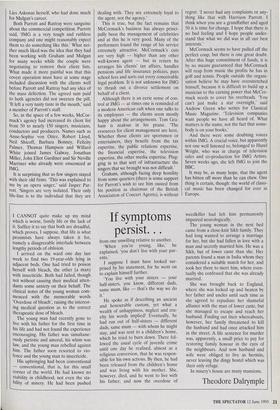If symptoms persist. .
I CANNOT quite make up my mind which is worse, family life or the lack of it. Suffice it to say that both are dreadful, which proves, I suppose, that life is what pessimists have always taken it for, namely a disagreeable interlude between lengthy periods of oblivion.
I arrived on the ward one day last week to find two 19-year-olds lying in adjacent beds. One had tried to poison herself with bleach, the other (a man) with insecticide. Both had failed, though not without causing their medical atten- dants some anxiety on their behalf. The clinical notes of the young woman com- menced with the memorable words `Overdose of bleach', raising the interest- ing medical question as to the correct therapeutic dose of bleach.
The young man had recently gone to live with his father for the first time in his life and had not found the experience encouraging. His father was simultane- ously pietistic and amoral, his whim was law, and the young man rebelled against him. The father soon resorted to vio- lence and the young man to insecticide.
His upbringing had been conventional — conventional, that is, for this small corner of the world. He had known no stability in childhood, not even the sta- bility of misery. He had been pushed from one unwilling relative to another. `When you're young, like,' he explained, 'you don't live with your par- ents.'
I suppose I must have looked sur- prised by his statement, for he went on to explain himself further. `You live with your sisters — your half-sisters, you know, different dads, same mum, like — that's the way we do it.'
He spoke as if describing an ancient and honourable custom, yet what a wealth of unhappiness, neglect and cru- elty his words implied! Eventually, he had run out of half-sisters — different dads, same mum — with whom he might stay, and was sent to a children's home, which he tried to burn down. There fol- lowed the usual cycle of juvenile crime until one day he realised, almost as a religious conversion, that he was respon- sible for his own actions. By then, he had been released from the children's home and was living with his mother. She, however, died, and he went to live with his father; and now the overdose of weedkiller had left him permanently impaired neurologically.
The young woman in the next bed came from a close-knit Sikh family. They had long wanted to arrange a marriage for her, but she had fallen in love with a man and secretly married him. He was a Sikh, but of lower caste than she. Her parents found a man in India whom they considered a suitable match for her, and took her there to meet him, where even- tually she confessed that she was already married.
She was brought back to England, where she was locked up and beaten by her father and uncles until such time as she agreed to repudiate her shameful alliance with the man of lower caste, but she managed to escape and reach her husband. Finding out their whereabouts, however, her family threatened to kill the husband and had once attacked him in the street. A life sentence for murder was, apparently, a small price to pay for restoring family honour in the eyes of the neighbours. And now husband and wife were obliged to live as hermits, never leaving the dingy hostel which was their only refuge.
In misery's house are many mansions.
Theodore Dalrymple


































































 Previous page
Previous page